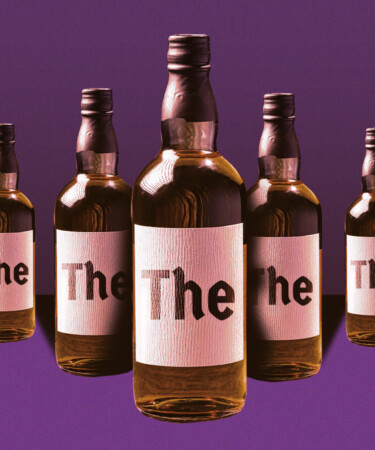If you’ve ever seen “The Social Network,” you probably remember the scene where Sean Parker tells Mark Zuckerberg and co. to tweak the name of their rising social media platform. “Drop the ‘the.’ Just Facebook. It’s cleaner,” he declares. And as insufferable as the character was on screen, there’s no denying he was right.
But in the wild world of Scotch, “the” appears to be a non-negotiable for brands’ and distilleries’ names, brevity be damned. There’s The Glen Grant, The Macallan, The Dalmore, The Glendronach, and The Balvenie, and those are just a few examples. Many have pondered why so many Scotch producers have “glen” in their names, but the pervasive “the” has remained a mystery. Well, that’s where we come in.
The Name Game
To understand where the “the” came from, we need to roll back the clock to the 1860s. Speyside’s The Glenlivet Distillery was enjoying skyrocketing popularity, so other distilleries began crudely adopting the same name, despite not operating near the glen (a deep, narrow valley surrounded by mountains) the brand was named for. Unsurprisingly, the owners of The Glenlivet Distillery weren’t thrilled about this. In November 1865, they issued a statement aimed at their competitors from their landlord, the Duke of Richmond and Gordon: “The District of Glenlivet, a part of the Gordon property in Scotland, belongs to me. My tenants George and John Gordon Smith, whose distillery of malt whisky is called ‘The Glenlivet’ – are the only distillers in the Glenlivet district. Richmond.”
This letter didn’t stop more distilleries from snatching up the Glenlivet name. After George Smith passed away in 1871, his son John Gordon inherited The Glenlivet Distillery and attempted to put the legal kibosh on the faux-Glenlivets. In 1881, he wrote a statement to the court claiming that “dealers were beginning to sell as Glenlivet Whisky lower priced Whiskies of a different character … by tacking on the word Glenlivet to the name of a particular distillery.”
Still, the competition wasn’t having it. According to author and Scotch whisky expert Charles MacLean, Smith’s competitors claimed that “Glenlivet” had become a generic term during the illicit era and could now be used in the same way as “Islay” to define a style of whisky. Nonetheless, Smith and the Glenlivet Distillery’s blender, Andrew Usher, hammered away at gaining total ownership of the name, racking up a 30,000-pound legal bill and filing 400 affidavits in the process.
By May 1884, the court arrived at a half-baked settlement. It ruled that only Smith and Usher’s whisky could call itself The Glenlivet, but it allowed 10 other distilleries — including Macallan, Glenfarclas, and Glen Grant — to use “Glenlivet” as a hyphenated suffix. To make matters worse for the original Glenlivet Distillery, according to MacLean, many distilleries beyond the designated 10 started doing the same, too, presumably because although the agreement was legal, doing so technically didn’t infringe on Smith’s trademark.
Come the 1950s, a whopping 27 distilleries had “Glenlivet” either tacked on to their registered names or somewhere on their bottle labels. But eventually, many of these distilleries ended up dropping the suffix, likely to avoid consumer confusion and to tighten up their labels.
Here Comes the The
Even though most of the wannabes had dropped “Glenlivet” from their names, they weren’t entirely done jacking the distillery’s nomenclature. Beginning in the 1970s, many of the former “X-Glenlivet” brands adopted the original distillery’s definitive article: The. The trend caught on like wildfire: Macallan became The Macallan in 1975, and Glendronach renamed itself The Glendronach around the same time. Glenturret joined in 1988, and Glen Grant followed suit in the early aughts. Nowadays, there’s a whole laundry list of ‘em. But as MacLean tells us, “There is only one true ‘the’ distillery: The Glenlivet.”
There is one exception to the the-fication craze of the late 1900s: Balvenie adopted “the” back in 1883. But when it comes to Scotch marketing, it’s safe to say that “the” belongs to everyone.
